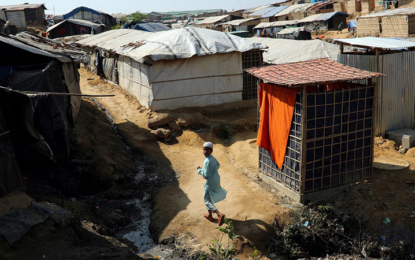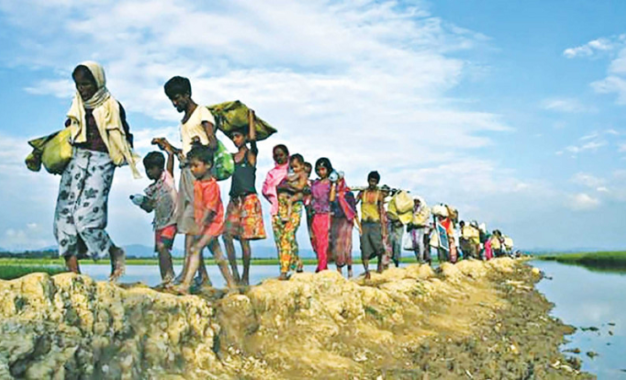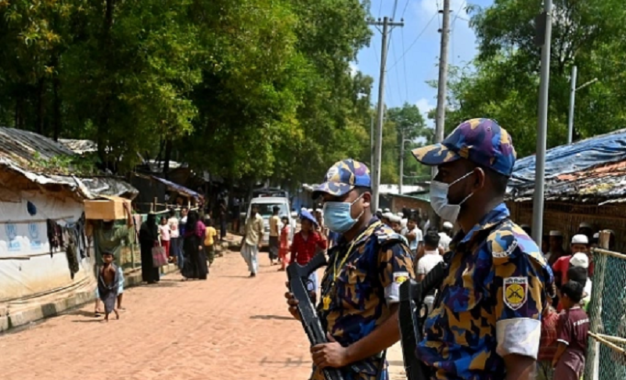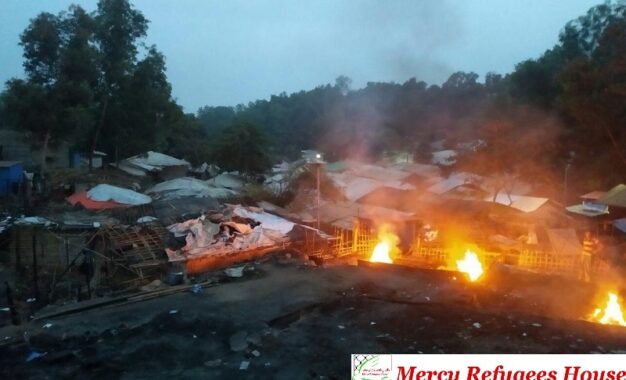Latest News
5 things you need to know about the Rohingya crisis — and how it could roil Southeast Asia
Human Rights, Myanmar, Refugees Issues, Video
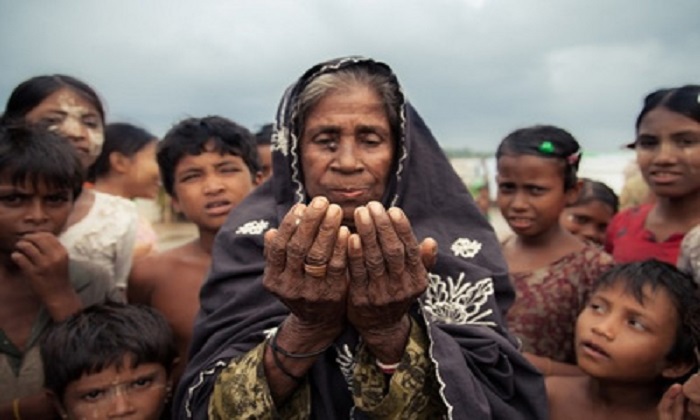
A humanitarian catastrophe is unfolding along the Bangladesh-Burma border. More than 370,000 Rohingya have fled a violent military crackdown in Burma, also known as Myanmar, and are crowded in desperate conditions in Chittagong, Bangladesh. This political and humanitarian emergency is acute, volatile and could breed instability in Bangladesh and beyond.
Here are five points essential to understanding the complex and multidimensional crisis.
1. Civilians are paying the price for a small, armed insurgency
For decades, Burma has systematically persecuted the Rohingya, an ethnic and religious minority living in the state of Rakhine; at times, that persecution has included violence. But the current scale of attacks is unprecedented. So what set it off?
The simplest explanation is that on Aug. 25, the Arakan Rohingya Salvation Army (ARSA), an armed rebel group of several hundred fighters, launched attacks on more than 25 military and border police posts, reportedly killing a dozen Burmese security personnel. Led by an ethnically Rohingya but Pakistan-born and Saudi-raised militant named Ata Ullah, ARSA claims to seek an autonomous Muslim state for the Rohingya. Burma classifies it as a terrorist group. It’s not clear how much support ARSA actually claims among the Rohingya.
Nevertheless, in response to ARSA’s attacks, Burma’s military has launched a massive “clearance operation,” which the U.N. high commissioner for human rights Zeid Ra’ad al-Hussein has called “a textbook example of ethnic cleansing.” Selective and indiscriminate violence are widespread, with reports of massacres, rape, landmines and whole villages being burned down.
2. Yes, it’s about religion and ethnicity
A Muslim minority, the Rohingya are denied citizenship by Burma and are targeted by a powerful right-wing extremist campaign led by Buddhist monks. These Buddhist nationalists are well organized, socially influential and difficult to control.
The monks are particularly active on social media, where they shape public discussions. They claim to seek to limit interreligious marriageand purify the Burmese nation, and they question the rights of non-Buddhists to be in Burma.

Members of Burma’s Rohingya ethnic minority walk through rice fields after crossing the border into Bangladesh near the Teknaf area of Cox’s Bazar on Sept. 5. (Bernat Armangue/AP)
3. But it’s also about natural resources — especially land
The repression of the Rohingya is about more than ethnic cleavages and identity politics; it’s also about natural resources. For centuries — if not millennia — the Rohingya have lived in the Arakan area between Burma and Bangladesh. Historically, peasant communities moved freely through the region. But once modern state boundaries were established, movement was restricted. As land became a precious and profitable asset, laws were introduced by the military junta government and ramped up in the 1990s, disenfranchising rural farmers so that others could profit.
Over the past 50 years, Burma’s military has increasingly helped the state and large corporations grab land. The state has expanded control over territory and water supplies to advance its economic interests in mining, oil, natural gas, timber and agriculture. Despite recent ostensibly democratic reforms, the military leadership maintains enormous power over every sector of governance and business development. Eager to promote economic growth, the military has let Chinese, Korean, Japanese and other multinational investors work in areas inhabited by ethnic minorities such as the Rohingya, Karen, Mon and Shan.
Burma State Counselor Aung San Suu Kyi has attracted increasing international criticism for her failure to stop the violence against the Rohingya. But Burma’s Constitution gives her position no real authority over the military.
So who could stop this? International stakeholders who are interested in doing business with Burma but wary of reputational costs could pressure the military leadership to end the hostilities. This is urgent, and not just for displaced populations. Continued violence and an exploding population of refugees could further destabilize the region.
4. Bangladesh can’t deal with this crisis alone
Bangladesh, simply put, can’t indefinitely handle the humanitarian disaster that has arrived on its shores. One of the most densely populated countries in the world, Bangladesh is home to more than 160 million people tightly packed into a place about the size of Iowa. With approximately $1,500 GDP per capita, this small, poor country is also highly susceptible to climate change. Some of the worst flooding in decades just hit Bangladesh, where natural disasters are common and southern shorelines are eroding.
For now, the Bangladesh government and political elites are welcoming the Rohingya refugees. But half a million displaced people quickly become an enormous burden for a poor nation. Local villagers and small businesses in Cox’s Bazaar, Teknaf and neighboring areas have pooled resources, opened their homes and even helped bury the dead.
But how long can the welcome last? As aid pours in for refugees, resentment could breed over perceptions of inequality among underserved native populations. Undocumented Rohingya are traveling beyond the camps to areas inland, searching for opportunities. Ample research and evidence suggest that this can create new conflicts and competition over limited resources, especially as refugees stay longer and seek to settle permanently — as we can see everywhere from the Middle East to Europe to the United States.
Bangladesh is a Muslim-majority country with a secular government. It’s facing a rising threat of violent extremism from Islamist hard-liners, some allied with transnational networks such as al-Qaeda or the Islamic State. The governing Awami League has responded by clamping down on dissidents with tactics such as forced disappearances and extrajudicial killings. Depending on how Prime Minister Sheikh Hasina copes with the refugee crisis and the security and economic challenges it presents, opposition groups might try to capitalize on the plight of the Rohingya Muslims. The Bangladesh Nationalist Party (BNP) and Islamist Jamaat-e-Islamii party accuse the Awami League of not doing enough soon enough to support the Rohingya. The ruling coalition accuses Jamaat of supporting militants in Rakhine, and the BNP of spreading “conspiracies” about the government’s response to the humanitarian disaster.
To donate and contribute to Rohingya refugees and Rohingya students, please go to www.allmercy.org
Internationally, Bangladesh has limited power to rally support for itself and the Rohingya. While visiting refugee camps this week, Hasina called for Burma to take back the Rohingya and shelter them safely in their homes. Few expect the Burmese generals to heed her plea.
5. No other international actor appears to be stepping in to help solve the political crisis
So can Bangladesh expect help from others in the region? Probably not. India has traditionally been Hasina’s ally. But Prime Minister Narendra Modi has failed to criticize Burma’s military operations against civilians, and Indian Home Minister Rajnath Singh has described Rohingya who are in India as illegal immigrants and a national security threat.
What about beyond? Several Muslim-majority countries from Turkey to Malaysia have condemned the violent persecution of the Rohingya, but haven’t engaged in helping solve the crisis. Last week, Indonesia’s foreign minister met with Suu Kyi and then visited her Bangladeshi counterpart, offering to help resolve the Rohingya crisis.
Also Read- Rohingya teen dreams of higher ed from squalid refugee camp
But neither SAARC (South Asian Association for Regional Cooperation) or ASEAN (Association of Southeast Asian Nations), two regional intergovernmental organizations, has stepped up to help mediate a diplomatic solution. The United Nations and the European Union are working on improving dire humanitarian conditions on the ground, but have made no progress on solving the larger problems that have pushed the Rohingya out of their homes.
Amazon Sponsorship
Recent Posts
Jul 29, 2023
It has been close to six years since hundreds of thousands of Rohingya faced a deadly genocide by Myanmar’s military and fled the country in search of protection and refuge in neighbouring Bangladesh. The Rohingya population has been undergoing persecution, discrimination, arbitrary arrests, and atrocities in Myanmar for over seven decades. Their condition is alarmingly […]


